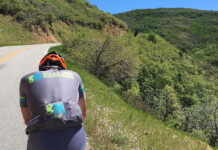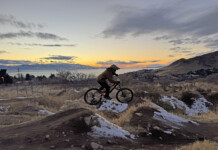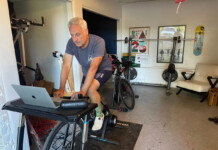When I moved back to the Beehive State from the San Francisco Bay Area in June of last year, I was surprised by the strength of Utah riders. I was also impressed by the abundance of cyclists, both racers and recreationalists; the courtesy shown by most drivers (not to be taken for granted); and the number of athletes working with coaches.
I was staying with a buddy in Farmington while looking for a permanent residence closer to downtown SLC. I loved riding south on the exquisite Legacy Trail, up steep streets to the Utah Capitol building, past City Creek Canyon, the “U” and Hogle Zoo, then up and over Emigration Canyon for a final surge up Big Mountain. Man, it was nice to be once again living and cycling in Utah, one of the country’s best kept secrets.
I had taken some time off racing and was sucking wind at altitude, sure, but was nonetheless quickly freed of a potential NorCal superiority complex when I showed up UCA races; these guys and gals were fast. I was once again racing against former nemeses, such as Dave Harward, as well as with new pals like Mike Sohm. I was also making friends just about every time I pedaled, whether alone or on group rides.
And yet, there seemed to be a climate of division and partisanship. Nothing exclusive to the Utah cycling scene, mind you; I had had a similar experience after moving back to my hometown of Palo Alto, CA from Utah at the end of 2005. In fact, so unwelcoming was the climate in Northern California that I started my own racing program in 2006, which became and still is a prominent team in that region.
When I first got serious about bike racing ten years ago, competing along the Wasatch Front had been quite welcoming. I still remember many of the Crit Series and UCA personalities from that time period, and how they influenced me as an athlete, person and bike racer. Many are still dominant figures in Utah cycling.
As a cyclist, I am thrilled to live in a state that offers unlimited high-altitude terrain, on and off-road, as well as endless miles of milder, red rock riding to the south. As a competitor, I am also grateful for the abundance of weekday rides and races, something I missed while living in Northern California. Utahans have it good: Beautiful venues for training and racing, colorful people to keep it interesting, and monster athletes – including locally based pros – making riding and racing hard as well as fun.
Which brings us back to the “climate” of Utah cycling and how we can work to keep it awesome for everyone, the ultimate purpose of this article. Let’s consider some universal principles as they apply to the health and future of our sport in this incredible state:
- High tide floats all boats.
- Each individual is important, no one is indispensable.
- Overcoming differences is easier than we think and will benefit everyone.
High Tide
If we all keep in mind that the better we represent and participate as cyclists, the more the sport will grow in Utah and benefit all parties involved – event and race promoters, bike shops, riders, and even riders’ families.
The more we make cycling cool, as opposed to a fraternity closed to the uninitiated or less experienced, the more we’ll gain converts each year. If we do so with dedication, as well as common sense, the more those indirectly connected with cycling will benefit, as well.
Case in point: One of the riders Dave Harward and I have recruited to race with us in 2012 has been overeating and undertraining the past year or two. He’s now riding with us multiple times each week, and his wife is thrilled that he is so happy, getting slimmer and gaining fitness from week to week. But that’s not all: He’s so excited to be back on his bike that he is working to get friends into cycling, whether or not they decide to participate in organized events.
Everyone Is Important
No one owns this sport; it belongs to anyone and everyone who throws their leg over a bike. We have witnessed our passion at the elite level beleaguered by doping, including the fall of many would-be heroes. Yet, the raw exhilaration that is cycling remains intact and always will. In fact, equipment innovations have made it cooler, easier and more appealing than ever.
For those who have attained a high level of fitness, and especially for those who can boast accomplishments in the form of race results, it is important to understand the impact their actions may have on others. Competition in the spirit of sportsmanship is an exalted endeavor, both in training and racing. However, arrogance or disregard for the less accomplished can undermine the overall health of our sport, as well as the cycling industry.
Encouraging rather than discouraging or even bullying will do wonders for cycling: we’ll get more people on bikes, sell more equipment spawning further innovation, and ultimately have more competition on rides and out at the races. Club organizers, event promoters and bike shops all play a key role, so it behooves us to support them as best we can.
Setting Aside Differences
In the same vein, it would be immensely beneficial to keep our pride (and insecurities) at bay for the greater good.
Of course it’s terrifying when we deal with inattentive and even hostile drivers, as well as a general lack of appreciation for our pastime. However, deep down we understand that meeting hostility with hostility won’t make us any safer or build long-term respect for cycling.
And heated rivalries may generate marketable press at the pro level, but at the local level can prove detrimental. The truth is that we generally harbor deep and abiding admiration for the riders who have always been that little bit stronger, and who have pushed us harder than we are willing to push ourselves. Where would we be without them?
The same goes for clubs, teams and the shops that support them. Rides and races wouldn’t be half as fun without the squads who inspire us to train, race and recover more intelligently. In the small world that is the Utah cycling community, competitors may someday be teammates, while sponsor shops and brands may someday support us.
Dissing other riders or teams, exchanging harsh words in the heat of battle, or allowing ourselves to be smug because we’ve reached a certain level only harms our beloved sport. Acknowledging the value of worthy competitors makes riding and racing more fun. Apologizing after an altercation usually sets things right. Being humble (and smart) enough to ask more experienced athletes for guidance is the quickest and most effective way to learn.
As coaches and managers of a new Utah rider development program for 2012, Team Plan7, Dave Harward and I, along with our teammates, hope to contribute positively to the state’s cycling landscape this year and beyond. If you have questions or feedback for us, we’re all ears: contact@plan7coaching.com.
Dave Harward and Mark Deterline offer over thirty years of combined endurance training and competitive experience. Plan 7 Endurance Coaching provides professional coaching, biomechanics (bike fitting) and testing services for athletes of all levels.







